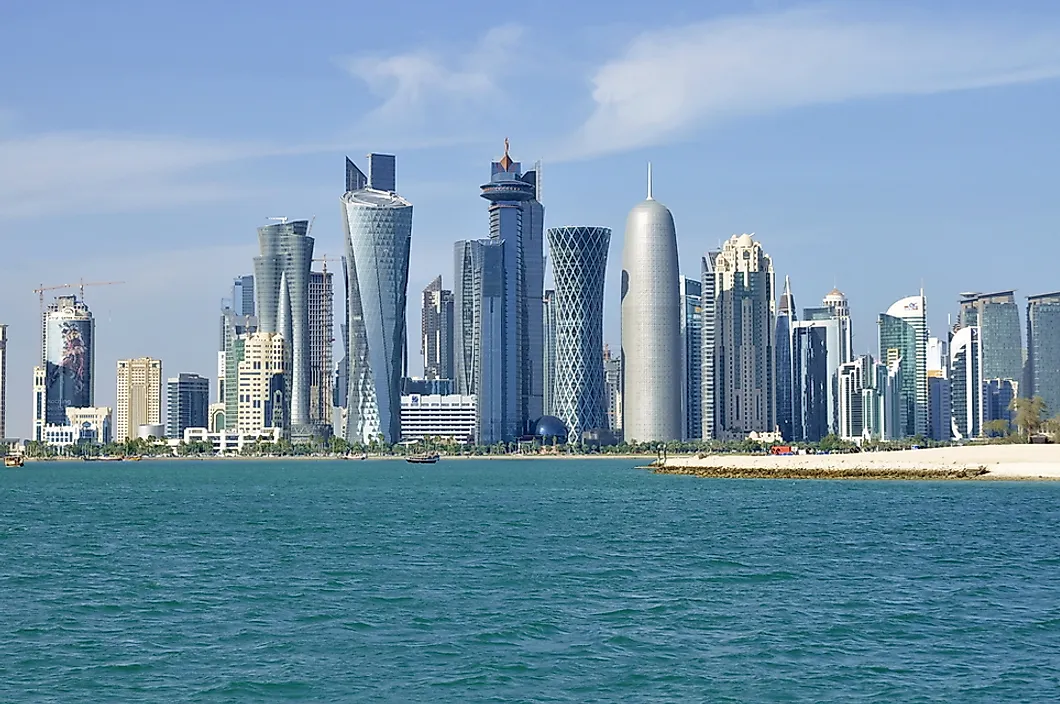What Continent Is Qatar In?

Considered part of the Middle East, Qatar is a nation situated on the northeastern part of the Arabian Peninsula, now called the Qatar Peninsula, in Western Asia. The country is one of the wealthiest nations in the world. Driven by petroleum exports, the country's economy is booming. The tourism industry has also experienced significant growth in recent years.
Demographics
Qatar has a seasonal population, which means that significant segments of the population either leave or enter the country on labor contracts depending on the time of year. Therefore, fluctuations in the country's population are erratic and high spikes in population are common. The country's native population is relatively small. In fact, only 400,000 of the nation's total population, which is more than 2,500,000, identify as ethnic Qataris. The remainder of the population are migrant workers who have come to work on permits or contracts, as well as foreigners who have taken up residence in the country.
The country's official language is Arabic, which is understood by all ethnic Qataris. However, due to the influx of workers and foreign residents, English is now widely spoken and understood. English is now so common in Qatar that the government has been forced to take steps to make sure that the Arabic language is preserved in the nation.
Flora and Fauna
Qatar is mainly a desert nation, so little flora and fauna exist. However, there are about 21 different species of mammals that are native to the Qatar peninsula, but many face extinction due to hunting. As a result, the government has introduced measures to make sure the species are protected. Large game reserves have been established across the nation that give sanctuary to endangered mammals such as the Oryx and the Arabian Gazelle. Qatar is renowned for its dugong species, most of which live near the coast.
Qatar does have a large number of bird species due to its coastal location. In fact, estimates suggest that about 215 avian species, either migrating or native, exist on the Qatari coastline. Kentish plovers are especially common, as are the Socotra cormorants, and a number of varieties of sanderlings. The country also has a large number of fish species that live in its waters. Studies show that approximately 165 different varieties of fish are present in Qatari waters.
Although Qatar is a desert nation, numerous herbs and shrubs grow in the arid climate. It is believed that more than 300 species of plants grow in Qatar's deserts. All of these species are small and resistant to the desert heat, and therefore species like Vachellia tortilis and Zygophyllum qatarense are relatively common in the area. A unique feature of the Qatari landscape is the Lycium shawii, which is a plant that has adapted over time and is now able to survive the Qatari weather.
Culture
Qatar has a rich Arabian culture, which is filled with Islamic influence, Arabian styles, and reference to the ocean and desert are evident in almost all aspects of the culture. These influences are especially evident in the architecture of Qatari buildings and skyscrapers. Qatar's cuisine has a rich abundance of protein dishes, while vegetarian dishes are relatively uncommon. This may be explained by the fact that very few vegetables are grown within the country.
Tourism
Tourism in Qatar is growing, and the government has paid special attention to developing the hospitality industry, and the entire country is now dotted with luxury resorts and hotels. An important aspect of Qatar's tourism industry is the hosting of many global events. For example, Qatar recently made a winning bid for the FIFA World Cup, and the country has starting developing a number of projects that will enhance the tourism industry even further.
Climate
Qatar has an arid climate, and therefore summers are dry and blistering heat is common. Winters are warm, although temperatures sometimes drop during the night, especially during the summer. The country receives little precipitation, although some rainfall does occur in the late summer months.











